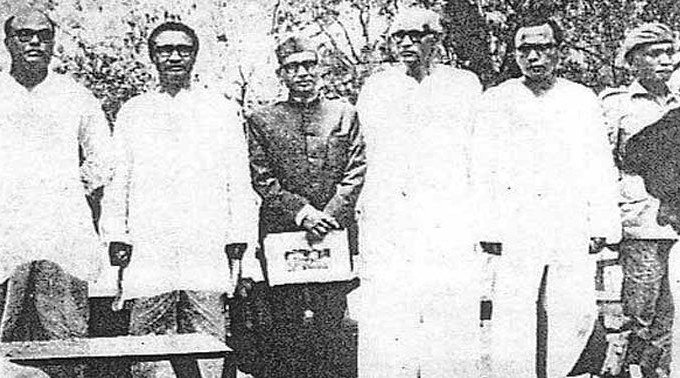Thousands of people lined the streets and greeted the leaders with chants of ‘Joy Bangla’
Ali Asif Shawon: On December 12, 1971, top leaders of the Mujibnagar government returned to home soil after months of exile in Kolkata, India.
They had to flee the country shortly after the formal proclamation of independence on April 10, shortly after the military regime launched “Operation Searchlight”.
The cabinet members of the Provisional Government took their oaths at the town of Mujibnagar, in what is now Meherpur, on April 17.
On December 12, acting president Syed Nazrul Islam drove to Jessore from Kolkata along with Prime Minister Tajuddin Ahmad and other leaders of the Mujibnagar government to make their first appearance inside Bangladesh territory. Local freedom fighters provided an escort.
Thousands of people lined the streets and greeted the leaders and their colleagues with chants of “Joy Bangla”.
Prime Minister Tajuddin Ahmad gave a rousing speech in front of a huge crowd at the Jessore Town Hall, where he outlined the government’s vision for the new country and promised to frame a constitution as soon as possible.
“No more destruction or war. This is the time to rebuild the war-ravaged Bangladesh,” he said.
Tajuddin Ahmed directed the then-deputy commissioner of Jessore, Waliul Islam, and officer-in-charge of Kotwali police station to take all necessary steps to maintain law and order.
“Take legal action against perpetrators of crimes, whoever they may be,” he said.
He also declared Jamaat-e-Islami, Muslim League and Nejam-e-Islam illegal, as the Independent Bangladesh would not allow religion-based politics.
“Let’s build a new world where there is no scope to exploit the millions of hungry and suffering people in Bangladesh. Let us pledge to ensure freedom from hunger, disease, unemployment, and illiteracy,” the then-prime minister added, stressing the need for unity and collaboration.
“Let there be a newly democratic society built from the blood and sweat of martyrs of the free Bangladesh,” he said.
Meanwhile, Pakistan Army Lt General Niazi ordered his troops to resist the pro-liberation forces at any cost.
He also addressed international journalists, as the US pressured both India and Pakistan to accept a ceasefire offer of the UN General Assembly.
White House spokesperson Ronald Zieglersays at the time said US President Richard Nixon was consulting with his security advisor Henry Kissinger on the situation in the subcontinent.
Liberation forces faced stiff resistance from the Pakistan occupation army at the Hili frontier. They launched a comb operation at Gobindaganj Pakistan Army base on the Bogra-Rangpur highway, with most of the Pakistani troops surrendering by the early morning.
The Pakistani garrisons in Jamalpur also surrendered to Liberation Forces, putting up little resistance.
There was fierce bloodshed in Haluaghat, Mymensingh, after which retreating Pakistani forces destroyed numerous bridges while heading towards Tangail.
Airstrikes on Dhaka were temporarily stopped at the request of the UN to evacuate foreign nationals from the city.
Pakistan Major General Rao Farman Ali urged for an emergency ceasefire to evacuate Pakistanis from Dhaka, but then-President of Pakistan Yahya khan did not consider it to be an official request.

